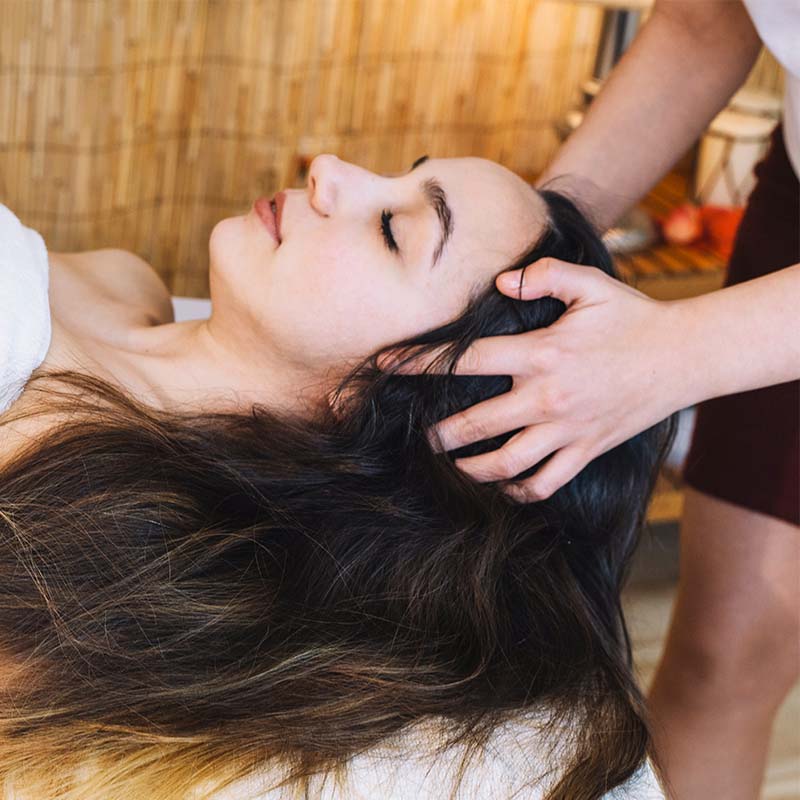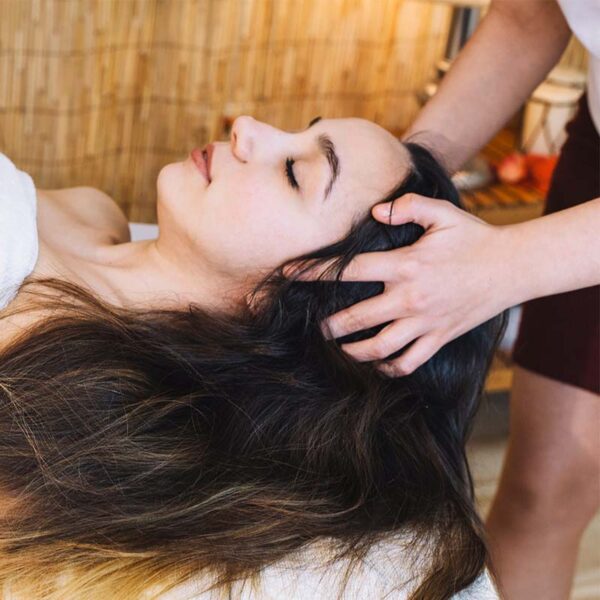
Nourish Your Locks: 5 Ayurvedic Hair Remedies for Strong, Shiny Hair
Introduction:
A lustrous, healthy mane is a crowning glory that enhances our confidence and beauty. In the ancient science of Ayurveda, hair care is regarded as an integral part of overall well-being. By understanding Ayurvedic hair remedies principles and incorporating natural remedies into our hair care routine, we can achieve strong, shiny hair that radiates vitality. In this blog, we will explore the wisdom of Ayurvedic hair care, from understanding our unique hair type to utilizing powerful herbal remedies for nourishment and rejuvenation.
Understanding Your Hair Type
1.1 The Three Doshas and Hair Care
In Ayurveda, the ancient Indian system of medicine, the concept of the three doshas—Vata, Pitta, and Kapha—forms the foundation for understanding our unique constitution and how it influences our overall health, including the health of our hair. Each dosha is associated with specific characteristics, and by identifying our dominant dosha, we can tailor our hair care practices to maintain balance and promote optimal hair health.
Vata dosha is associated with qualities such as dryness, roughness, and brittleness. Those with Vata-predominant hair may experience issues like frizz, split ends, and lack of moisture. Balancing Vata requires nourishing and hydrating hair care routines.
Pitta dosha is associated with qualities like oiliness, heat, and intensity. Pitta-predominant hair tends to be fine, prone to greasiness, and susceptible to inflammation of the scalp. Balancing Pitta involves calming and cooling hair care practices.
Kapha dosha is associated with qualities such as heaviness, oiliness, and stability. Kapha-predominant hair tends to be thick, strong, and lustrous but can be prone to excess oil and dullness. Balancing Kapha requires stimulating and cleansing hair care routines.
1.2 Determining Your Hair Type in Ayurveda
To determine your hair type according to Ayurvedic hair remedies, you can assess various factors such as the texture, density, and oiliness of your hair. Pay attention to whether your hair is fine or coarse, straight or curly, and how it behaves in terms of oiliness and moisture retention. Observing the qualities of your hair will help you understand its unique characteristics and determine your predominant dosha influence.
1.3 Tailoring Hair Care Practices to Your Hair Type
Once you have identified your hair type and dosha influence, you can customize your hair care practices to promote balance and enhance the health of your hair. For Vata-predominant hair, focus on nourishing and moisturizing treatments using natural oils and hydrating ingredients. Pitta-predominant hair benefits from gentle cleansing and cooling treatments to soothe the scalp and reduce excess oil. Kapha-predominant hair benefits from regular stimulation, deep cleansing, and light, non-greasy products.
By understanding your hair type and its relation to the doshas, you can create a personalized hair care routine that addresses your specific needs. Balancing your dosha influences and maintaining the health of your hair will result in strong, shiny, and vibrant locks that reflect your overall well-being.
Ayurvedic Herbal Remedies for Hair Care
2.1 Amla: The Superfood for Hair Health
Amla, also known as Indian gooseberry, is a powerful Ayurvedic herb renowned for its benefits for hair health. Rich in vitamin C and antioxidants, amla nourishes the scalp, strengthens the hair follicles, and promotes hair growth. It helps prevent premature graying, adds shine and luster to the hair, and addresses issues like dandruff and scalp inflammation.
2.2 Bhringraj: The King of Herbs for Hair Growth
Bhringraj, also known as Eclipta Alba, is considered the king of herbs for hair growth in Ayurveda. It is known to stimulate hair follicles, promote hair growth, and prevent hair fall. Bhringraj also helps in restoring the natural color of hair, improves texture, and nourishes the scalp, making it an excellent choice for maintaining overall hair health.
2.3 Hibiscus: The Flower Power for Strength and Shine
Hibiscus is a well-known Ayurvedic herb for promoting hair strength and shine. It helps in strengthening the hair follicles, preventing hair breakage, and reducing hair fall. Hibiscus also nourishes the scalp, balances scalp pH, and adds natural shine to the hair. It is an excellent choice for maintaining healthy and lustrous hair according to ayurvedic hair remedies.
2.4 Brahmi: The Nourishing Herb for Scalp Health
Brahmi, also known as Bacopa monnieri, is an Ayurvedic herb known for its nourishing and soothing properties. It helps in improving scalp health, reducing dandruff, and promoting healthy hair growth. Brahmi also has a cooling effect on the scalp, which helps in relieving scalp irritation and inflammation according to ayurvedic hair remedies.
2.5 Neem: The Cleansing and Purifying Miracle
Neem, with its antibacterial and antifungal properties, is a powerful Ayurvedic herb for maintaining scalp health. It helps in cleansing the scalp, removing excess oil and impurities, and preventing scalp infections. Neem also promotes hair growth and helps in controlling dandruff and itching as per ayurvedic hair remedies.
2.6 Coconut Oil: The Nutrient-rich Elixir for Hair
Coconut oil is a staple in Ayurvedic hair remedies routines. It is rich in essential fatty acids, vitamins, and minerals that nourish the hair follicles, strengthen the hair strands, and promote healthy hair growth. Coconut oil also provides deep conditioning, adds shine, and helps in preventing protein loss from the hair.
2.7 Fenugreek: The Secret Ingredient for Hair Thickening
Fenugreek, also known as methi, is an Ayurvedic herb that promotes hair thickening and strengthens the hair roots. It is rich in proteins and lecithin, which help in nourishing the hair follicles, stimulating hair growth, and reducing hair fall. Fenugreek also adds volume to the hair and addresses scalp issues like dandruff.
2.8 Shikakai: The Natural Cleanser for Gentle Hair Care
Shikakai is a natural cleanser widely used in Ayurvedic hair care. It gently cleanses the scalp and hair without stripping away natural oils. Shikakai helps in maintaining a healthy scalp, preventing dandruff, and promoting soft and shiny hair. It is a gentle alternative to harsh chemical-based shampoos.
2.9 Reetha: The Natural Surfactant for Soft and Silky Hair
Reetha, also known as soapnut, is a natural surfactant that effectively cleanses the hair and scalp. It helps in removing dirt, excess oil, and product buildup, leaving the hair clean and refreshed. Reetha also adds softness and silkiness to the hair, making it a popular choice in Ayurvedic hair remedies.
2.10 Rosemary: The Stimulating Herb for Hair Growth
Rosemary is an aromatic herb known for its stimulating properties that promote hair growth. It improves blood circulation to the scalp, strengthens the hair follicles, and reduces hair fall. Rosemary also helps in controlling dandruff, soothing an itchy scalp, and adding a pleasant fragrance to the hair.
By incorporating these Ayurvedic hair remedies into your hair care routine, you can nourish your hair, address specific hair concerns, and maintain strong, shiny, and healthy locks naturally.
Ayurvedic Hair Care Practices
3.1 Scalp Massage: Nurturing Roots and Enhancing Circulation
Scalp massage is an integral part of Ayurvedic hair remedies. It involves gentle circular motions with your fingertips to stimulate the scalp and enhance blood circulation. This practice helps nourish the hair follicles, promotes hair growth, and strengthens the roots. You can use Ayurvedic oils such as coconut oil, Brahmi oil, or Bhringraj oil during the massage to provide deep conditioning and nourishment to the scalp and hair as per ayurvedic hair remedies.
3.2 Herbal Hair Oiling: Deep Conditioning and Nourishment
Herbal hair oiling is a deeply nourishing practice in Ayurveda. It involves applying warm herbal oils to the scalp and hair strands, allowing the oils to penetrate deeply and provide intense conditioning. Ayurvedic oils such as Brahmi oil, Amla oil, or a blend of various herbal oils can be used for this purpose. Regular hair oiling helps moisturize the scalp, strengthen the hair roots, prevent hair fall, and promote overall hair health with ayurvedic hair remedies.
3.3 Herbal Hair Masks: Rejuvenating Treatments for Hair Health
Herbal hair masks are rejuvenating treatments that promote hair health and address specific concerns. Ayurvedic herbs like Amla, Bhringraj, Fenugreek, and Hibiscus can be combined with natural ingredients like yogurt, aloe vera, or coconut milk to create nourishing hair masks. These masks help in repairing damaged hair, improving hair texture, balancing scalp pH, and adding shine. Apply the mask to your hair and scalp, leave it on for a specified time, and then rinse thoroughly for revitalized and healthy-looking hair with ayurvedic hair remedies.
3.4 Gentle Cleansing: Ayurvedic Alternatives to Harsh Shampoos
Ayurveda emphasizes gentle cleansing methods to maintain the natural balance of the scalp and hair. Harsh shampoos with sulfates and chemicals can strip away the natural oils, leading to dryness and damage. Ayurvedic hair remedies alternatives include using herbal powders like Shikakai, Reetha, or Amla mixed with water or herbal infusions to cleanse the hair. These natural cleansers effectively remove dirt and excess oil while keeping the scalp and hair nourished and balanced.
3.5 Hair Rinses: Herbal Infusions for Shine and Vitality
Hair rinses with herbal infusions are a great way to enhance shine and vitality. After shampooing or cleansing, prepare a herbal infusion using herbs like Hibiscus, Rosemary, or Nettle. Allow the infusion to cool and use it as a final rinse for your hair. These herbal rinses help in conditioning the hair, promoting scalp health, adding shine, and imparting a pleasant aroma. It’s a simple yet effective way to incorporate Ayurvedic hair remedies principles into your hair care routine.
By incorporating these Ayurvedic hair care practices into your routine, you can nourish your hair, promote hair health, and maintain strong, shiny, and vibrant locks naturally.
Ayurvedic Lifestyle Tips for Healthy Hair
4.1 Balanced Diet for Hair Nourishment
A balanced diet plays a crucial role in maintaining healthy hair. Include foods rich in vitamins, minerals, and proteins such as green leafy vegetables, fruits, nuts, seeds, legumes, and lean proteins in your diet. Ayurvedic superfoods like Amla, coconut, and sesame seeds are particularly beneficial for hair health. Avoid excessive consumption of processed foods, sugary snacks, and carbonated drinks as they can negatively impact hair health.
4.2 Stress Management for Hair Health
Stress can contribute to hair problems like hair loss and dullness. Practice stress management techniques like yoga, meditation, deep breathing exercises, and regular physical activity to reduce stress levels. Create a calm and peaceful environment for yourself and engage in activities that promote relaxation and well-being. Remember that a balanced mind reflects in healthy hair.
4.3 Adequate Hydration for Hair Moisture
Proper hydration is essential for maintaining hair moisture and preventing dryness. Drink an adequate amount of water throughout the day to keep your body and scalp hydrated. You can also incorporate hydrating fluids like herbal teas, infused water, and fresh fruit juices into your daily routine. Hydrated hair is more resilient, shiny, and less prone to breakage.
4.4 Protecting Hair from Environmental Damage
Environmental factors like sun exposure, pollution, and harsh weather conditions can damage hair. Protect your hair by wearing a hat or scarf when exposed to the sun, and use a leave-in conditioner or hair serum with natural UV protection. Minimize exposure to pollutants by covering your hair or using a protective spray. Additionally, avoid excessive heat styling and use heat protectant products when using styling tools.
4.5 Embracing Hair-Friendly Sleep Practices
Quality sleep is vital for overall health, including hair health. Create a relaxing bedtime routine and aim for 7-8 hours of uninterrupted sleep each night. Prioritize using a silk or satin pillowcase to minimize friction and hair breakage. Consider tying your hair loosely or using a soft scrunchie to avoid pulling or straining your hair while sleeping.
By incorporating these Ayurvedic lifestyle tips into your daily routine, you can support the health and vitality of your hair from within. Remember that healthy hair is a reflection of overall well-being and a balanced lifestyle.
Conclusion:
Incorporating Ayurvedic hair remedies wisdom into our hair care routine is a holistic approach to achieve strong, shiny hair. By understanding our hair type, utilizing potent herbal remedies, and embracing Ayurvedic hair care practices, we can unlock the secrets to healthy and vibrant locks. Let us embark on this Ayurvedic journey towards hair care and embrace the natural beauty that shines from within.




Ayurveda is really comprehensive and thorough in the way it treats or handles an ailment or health concern. There are many remedies for hair care though some herbs are a constant like Indian Gooseberry, Hibiscus, Aloe Vera, FalseDaisy, Coconut Oil, etc. You’ve done a great job compiling some of the best remedies they suggest.